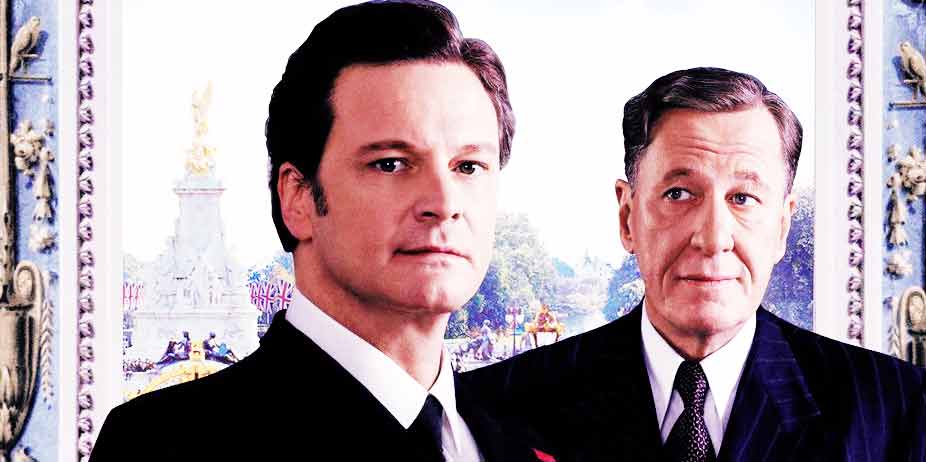 The
King's Speech (2010)
The
King's Speech (2010)
Imagine you cannot speak properly, that even the thought of doing so makes you nervous. Imagine that your entire life, you have been teased about your stammer. And then imagine the responsibility of giving the speech of a lifetime, intended to rally the people in a time of war...
Something must be done about Bertie. That is the state of mind of Her Majesty Elizabeth (Helena Bonham-Carter), after her husband Albert (Colin Firth) faces public humiliation after attempting to give a speech. Desperation prompts them to try a succession of speech therapists, without success, and at last lands her on the doorstep of the eccentric Australian, Lionel Logue (Geoffrey Rush). Accustomed to having his own way and not used to such rich clientele, he does not immediately set off on the right foot with "His Majesty," whom Lionel insists on calling "Bertie." After a particularly aggravating session, Bertie storms out intending never to return, his only souvenir a record copy of him reading aloud a passage from Hamlet.
Being second in line for the throne has its disadvantages... and it soon becomes apparent that public speaking may have to be in his future after all, when his elder brother Edward (Guy Pearce) shows more of an inclination to pursue a married American woman than toward the serious business of running a country. He is quite a disappointment to their father (Michael Gambon) and as the old monarch's health rapidly deteriorates, foreign powers are stirring abroad. England may soon have Hitler to contend with. Lionel makes tremendous advancements with Bertie but before them lies an impossible task, a great challenge, and the most terrifying and ultimately exhilarating moment of Bertie's life, wrapped up in one single, dreaded word: "abdication."
Critics think it likely this film will take home a slew of awards and I do not doubt it. It's brilliant. It's so good in fact that my father on walking out of the theater uttered, "That was excellent," which is a praise not often heard from him but that expressed how moving, fascinating, and ultimately entertaining he found it. This is not a stuffy costume drama but a character-driven story of personal failures and triumph, written in such a way that it constantly catches us off guard with bouts of humor, anxiety, and respect. Colin Firth delivers a glorious, nuanced performance that is even more heartwarming in its smaller moments than its outbursts -- him stammering through a bedtime story to his beloved daughters is touching, his bursts of anger understandable, and when his brother cruelly mocks him by taunting, "B-B-Bertie!" we literally want to reach through the screen and punch His Majesty in the face. Of course, he is supported by masters -- Geoffrey Rush is nothing short of terrific with perfect comedic timing, Helena gives quite a different, understated performance than her usual delightful insanity, and ... well, where would we be without a brilliant Churchill, in the form of Timothy Spall? He is on screen only a handful of times but for the first time, I saw him as a consummate actor, having mastered all the famous icon's mannerisms and speech patterns. Filling in the supporting cast is a long list of familiar names from BBC costume dramas -- including Anthony Andrews as the prime minister, Derek Jacobi as the Archbishop, and Jennifer Ehle as Mrs. Logue. (Yes, she and Firth do share screen time in one hilariously awkward meeting.)
Some of the camera angles feel a bit odd, since many of them are extreme close-ups, and there is a lack of music at certain moments, but overall the production value and screenplay are quite good. It explains the nuances and complications of the political unease of the time without ever losing the audience. Minor familiarity with the royal family is helpful but not really needed. Where content is concerned, it's minimal in most areas. There is some mild innuendo and an enormous fuss about Edward's affair with two different married women; it's implied that he prefers the tricks she learned in a bordello (of course, this is a British film, so it is stated much more discreetly). There's no violence. The high rating comes from a scene in which Bertie, struggling to express himself, is encouraged to swear (since stutters can swear without stuttering). He lets out a string of repeated f-words (mingled with s**t and other things), in a moment both comedic and offensive. Later, when under extreme stress, he repeats both words several times each. There are a couple of muffled harsh abuses of deity.
Normally, I would not give a movie with so many uses of the f-word a recommendation, but having them condensed in one place somehow makes them easier to deal with. With very little alteration, this film could have been PG... but then, would it have had a chance at the Oscars? It's doubtful, sadly. I believe that the historical importance of it, the incredible message behind it of perseverance and triumph over adversity, and a chance to feel great love and respect for a man who was remarkable in his own right overwhelm the negative aspects. Go see it and when it arrives on DVD, introduce it to other people with a little use of the remote control. After all, as my dad put it so well, "it's simply excellent."
